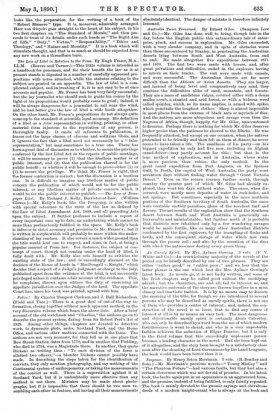Australia Twiee Traversed. By Ernest Giles. (Sampson Low and Co.)—Mr.
Giles has done well to bring, though late in the day, before the English public this extraordinary tale of enter- prise, pluck, and success in exploration. Mr. Giles succeeded, with a very slender company, and in spite of obstacles worse than those encountered by Stanley, in penetrating the Australian deserts lying between South and West Australia, from end to end. He made altogether five expeditions between 1871 and 1876. The first two were made with horses, and, after great privations and difficulties, ended in the explorers having to return on their tracks. The rest were made with camels, and were successful. The Australian deserts are far more difficult than the African or Asian deserts. They are larger, and instead of being level and comparatively easy sand, they combine the difficulties alike of sand, mountain, and forests. They are a mass of sandstone ridges, covered either with a dense mallee scrub, a stunted and arid forest, or with a hideous weed called spinifex, which, as its name implies, is armed with spikes which penetrate the toughest clothes. Sleep is almost impossible in most places from the swarms of black ants or myriads of flies. And the natives are more ubiquitous and savage even than the Negroes of Africa, though, happily for Mr. Giles, unaccustomed to firearms. Perhaps there is nothing for which Mr. Giles deserves higher praise than the patience he showed to the Blacks. He was frequently attacked, but except on one occasion, when the natives pretended to be friendly and then fell on them at dinner, he never seems to have taken a life. The smallness of his party—on his biggest expedition he only had five men, including an Afghan camel-driver—may partly account for this ; but that is the true method of exploration, and in Australia, where water is more precious than rubies, the only method. In the great camel expedition from Port Augusta, on the Spencer Gulf, to Perth, the capital of West Australia, the party went seventeen days without finding water through " Great Victoria Desert." Even on the return journey further north, through country the greater part of which Mr. Giles had already ex- plored, they went ten days without water. The oases, when dis- covered, were mostly mere deposits of water in rock-holes, and not springs. But sometimes, especially in the more northern portions of the Southern territory of South Australia, the oases were veritable earthly paradises, glens of the loveliest turf and flowers. The net results of the exploration show that the Southern desert between South and West Australia is practically un- traversable and uninhabitable ; but further north it is probable that districts now inhabited only by a few wandering savages would be made fertile, like so many other Australian districts condemned by the first explorers, by the trampling of flocks and herds, and the consequent storage of water which now runs through the poorer soil ; and also by the cessation of the fires with which the natives now destroy every green thing.






































 Previous page
Previous page